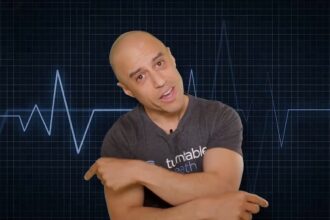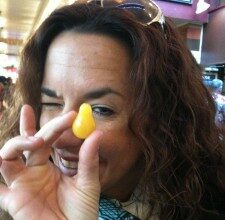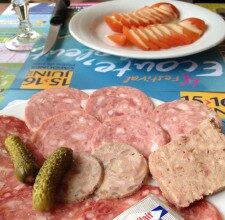How do you turn the flood of news and information into something useful? That’s what we try to do at Delve, and for our Wonk Lens series we ask smart people how they manage it. Dr. Topol is the first we’ll share, we’ll be posting similar interviews in the coming weeks. You can also check out the curated news channel we built based on Dr.
- The New York Times calls Eric Topol “a Naderesque crusader against drugs he deems dangerous, as well as their makers.” Topol sounded the alarm about the use of Vioxx for inflammation and arthritis, and a later meta-analysis published in The Lancet validated Topol’s position that the drug should have been pulled years earlier. Under his guidance as chairman of cardiovascular medicine the Cleveland Clinic earned its top ranking in heart care. During his tenure there he founded the Cleveland Clinic Lerner College of Medicine. But his willingness to criticize the deep-pocketed medical companies, on whose good graces academic institutions like the Cleveland Clinic often depend, led to his departure. He is now Director of the Scripps Translational Science Institute and his book, The Creative Destruction of Medicine, was published in 2012.
- Inquiring minds want to know, how do you go about getting your news, starting with when you wake up in the morning.
- Is there anyone in particular that gives you high signal to noise on Twitter?
- So after twitter, then what?
- Can you give me a couple examples?
- That sounds incredibly overwhelming. What’s your strategy? Are you skimming the abstracts? Or reading all the articles?
- How much time do you think this takes you each day?
- That was my next question: you have this huge stream of information, how do you organize it to turn it into something like a book?
- So all of this sounds like a pleasure but is there any part that’s a guilty pleasure? Lighter stuff?
- I’d like to ask for your thoughts on improving patient communication because you’ve written about this. We as patients can get so much information on the internet, it opens up amazing possibilities for the flow of communication. But it’s really hard to tell which information is high quality. So the internet has turned into this source of rampant confirmation bias. Do you think there’s a way to filter for quality information and turn this ease of access into a public health tool?
- Teaching the patients these research skills, how to assess information?
How do you turn the flood of news and information into something useful? That’s what we try to do at Delve, and for our Wonk Lens series we ask smart people how they manage it. Dr. Topol is the first we’ll share, we’ll be posting similar interviews in the coming weeks. You can also check out the curated news channel we built based on Dr. Topol’s interests here, and find more expert channels in the smart, social news reader we built for health professionals like you.

The New York Times calls Eric Topol “a Naderesque crusader against drugs he deems dangerous, as well as their makers.” Topol sounded the alarm about the use of Vioxx for inflammation and arthritis, and a later meta-analysis published in The Lancet validated Topol’s position that the drug should have been pulled years earlier. Under his guidance as chairman of cardiovascular medicine the Cleveland Clinic earned its top ranking in heart care. During his tenure there he founded the Cleveland Clinic Lerner College of Medicine. But his willingness to criticize the deep-pocketed medical companies, on whose good graces academic institutions like the Cleveland Clinic often depend, led to his departure. He is now Director of the Scripps Translational Science Institute and his book, The Creative Destruction of Medicine, was published in 2012.
Inquiring minds want to know, how do you go about getting your news, starting with when you wake up in the morning.
Well first thing I do is start out looking at Twitter. Twitter has been a game changer for me.
Is there anyone in particular that gives you high signal to noise on Twitter?
Well I don’t follow many people because there a so many people that, they tweet so much I don’t have time to go through all the tweets, so I only follow people that have a high signal to noise. My areas are digital medicine – so I am interested in genomics – and there are several people that are really good: Dan MacArthur, Gholson J. Lyon, and a couple others. And then in the wireless medical space there are also a few people I really cue into.
So after twitter, then what?
Then I go into the sites that I basically have organized in my bookmarks. I have a bunch of technology sites I visit. And then I go to the journals as they come out—usually before they come out because I’m an editor of a couple of websites so I get access. So I know exactly what time those pdfs are going to get posted several days before the articles come out.
Can you give me a couple examples?
Yeah sure, like on Tuesday in the late morning all the Nature journals post what’s going to come out the following Sunday – so Nature Genetics, Nature Medicine, Nature, Nature Biotechnology, and I review those. On Sunday at 5pm the articles for Science and Science Translational Medicine are posted in advance of when they come out on the following Wednesday and Thursday. You name the journal and I try to stay ahead of it. Basically the pure science information of what’s coming, whether it’s Cell, JAMA, The Lancet, the New England Journal, I’ll be aware of that. So the New England Journal they post on Friday at 7 am PST for the following Wednesday publication. So I’m a journal junkie because as an editor and as a researcher I want to know even before they break what’s going to be hot the coming week.
That sounds incredibly overwhelming. What’s your strategy? Are you skimming the abstracts? Or reading all the articles?
Well a combination. Unless it’s something interesting I can’t read the whole thing. But I’m a pretty rapid reader and that helps me. But then in the evening, I also look at the New York Times, Wall Street Journal, and other websites that provide news to the lay community, rather than a medical audience. Because I really want to see how this stuff is presented when it’s going to the public as opposed to the science community. And I wrote about it in my book, “The Creative Destruction of Medicine,” that over the years that gap has narrowed considerably and the respect for the consumer has increased substantially in the high quality lay press. And there are other things I follow regularly – like, you know that at 9 pm on Sundays is when the New Yorker comes out. So as long as I’m not doing something else at 9 pm I check that out. The Economist – I’m a devout reader – that comes out at 9 am on Thursdays. Then Science is 11 on Thursday, and then the JAMA issue comes out at 2. That’s my Thursday check out. No one has ever asked me this before. I’m usually on it. I’m a journal and news junkie.
How much time do you think this takes you each day?
Well it’s probably the most enjoyable part of my day. Well, I read every morning for about an hour – that’s Twitter, websites, journals – sometimes an hour and a half. And then in the evening that’s another hour or two depending. There are several techniques that have really helped me.
That was my next question: you have this huge stream of information, how do you organize it to turn it into something like a book?
I have this thing on my browser where you can just mark a link to go back and read it later. That’s really useful. Then for archiving, I make pdfs out of everything and I file them all. So once I’ve read it electronically I’ll put it into this really cool filing system I’ve made. I’ve just build a system of folders for all the topics I’m interested in. I also find Twitter as a great way to archive stuff – I can go back to my tweets and find links. That’s a really great data reservoir to find stuff I might have lost.
So all of this sounds like a pleasure but is there any part that’s a guilty pleasure? Lighter stuff?
Hmm. I read Time Magazine. I actually love to read books to so I try to fit that in. It’s a little tricky because there’s so much new stuff coming out each week, how do you balance that with books? But I find books are a good source of perspective. I love this stuff. And obviously there has to be time for other stuff like actually writing, or going over data, or having meetings, or just larger life.
I’d like to ask for your thoughts on improving patient communication because you’ve written about this. We as patients can get so much information on the internet, it opens up amazing possibilities for the flow of communication. But it’s really hard to tell which information is high quality. So the internet has turned into this source of rampant confirmation bias. Do you think there’s a way to filter for quality information and turn this ease of access into a public health tool?
It’s a challenge it’s even a challenge among the biomedical research community and now you are extending it to everyone. In a way that was the main reason I did the book. I was trying to teach the public about this stuff. So I did a whole chapter about the predator and the prey, understanding medical evidence—you know in a lot of cases there isn’t evidence, it’s eminence-based medicine rather than evidence-based medicine—and the caveats regarding relative risk, and all the things I thought the public should know about. I’m trying to push precisely what you are asking forward and I think we need a lot more of that to have a fully informed public. We need to make more of a conscious effort.
Teaching the patients these research skills, how to assess information?
Yes, I talk about in the book if you are looking for a doctor, how do you find the top expert in the country? In case you have the resources to go. You go into Google Scholar, you put in the topic, you check out how many citations—you know I just walk readers through examples. Because there are tools out there that are not Yelp. For example, anyone can have access to Twitter and why not follow the person who is the guru or expert in the health condition you are interested in? There’s all sorts of ways to tap into the cognoscenti of medicine that are not being used today. But in addition we need to take an active role in making it happen.
Delve tries to make all that easy: filtering news by topic, source, and by the experts like Topol who tweet about it. Delve is a social news reader designed to allow collegues to start conversations around relevant stories. It’s free to use (sign up here), and we are always happy to help get people set up (just email nate@delvenews.com).









